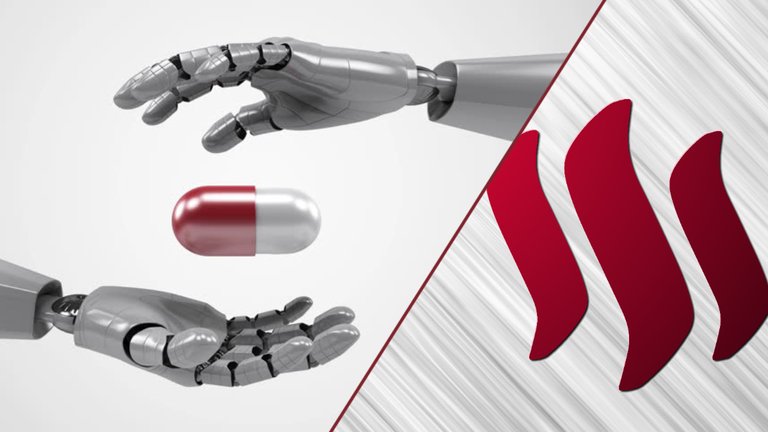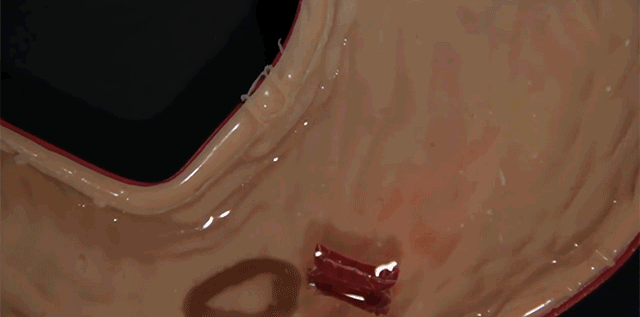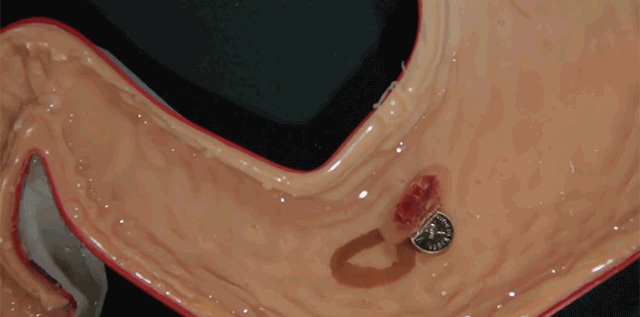
"Robots will replace our jobs in the future" - I think we've all read that a thousand times, but it's true.
One of the only professions we thought can't be replaced by robots is that of a Doctor - but maybe, even this job could be handled by robots soon.
Experts suggest that we will be in need of 40 million additional health workers by 2030 - so if we could find a way to let technology cover part of this burden, it could make a huge change.
Especially in remote areas or low-income countries that can hardly train enough health workers, technical innovations like these could provide lots of benefits.
There are already a few of these ingestible medical robots on the market, and today I'd like to show you some different examples.

Ingestible Origami Robot
This tiny robot has a magnet in its center, which can be controlled outside of the patient once it's reached his gut.
The innovation was developed at the Computer Science and Artificial Intelligence Laboratory at MIT.
It's called an "Origami Robot" because it's made out of magnets attached to dried pig intestines, and then encapsulated in ice to create a pill. Once it's reached the stomach, the structure slowly unfolds like a piece of Origami, revealing the magnet in the center.
While the technology itself is ready and works, the team is still waiting to do some in-vivo testing.
Getting that approval takes around 3 years - and then taking it from animal to human testing, another 3 years.
What could this robot be used for?
These tiny robots could patch wounds, deliver medicine on command, or remove foreign objects from the body.
One example would be recovering button batteries that have been swallowed - which happens over 3000 times a year in the US alone.
The robot could magnetically attach itself to the battery, remove it from the membrane where it's usually stuck to, and then simply transport it out of the body through the digestive system.


Robotic Insulin Pill
Rather than transporting something bad away from the body, tiny robots could also be used to deliver something good.
Millions of diabetics around the world are forced to inject themselves insulin - imagine what an impact it would have if you they could simply take the insulin in form of a pain-free pill!
Delivering biological drugs in oral form isn't a new idea, and has been tested countless times - but the challenge to overcome is that the enzymes in the stomach break down all proteins, which therefore wouldn't be absorbed properly.
Now, a research team from Rani Therapeutics in San Jose has developed a new coating for the pill that enables it to go past the stomach without being digested. The pill then moves on to the intestinal tract, where the insulin can be delivered through micro injections via tiny needles that consist of sugar crystals.
"Six years ago I was in a conversation with a pharma executive of a large US company. He mentioned that one of the things that would be a holy grail in biologics will be orally deliverable biologics and why no one has thought about it. (...) Intestines do not have sharp pain receptors like your skin does, so a needle that pokes your skin is painful, but if needle is poked into your intestine, you don't even feel it, so there is no pain"-Mir Imran, biotech entrepreneur and head of Rani Therapeutics

Autonomous Gelatin Robots
A research team at the Swiss Federal Institute of Technology in Lausanne (EPFL) has developed gelatin-based edible robots.
The soft structure doesn't need to be controlled externally, it uses chemical reactions with air and liquids to move in a worm-like manner.
The gelatin doesn't taste of anything and can be passed through the body's digestive system normally.
“A year ago, [co-author] Jun Shintake came to me and said, ‘we are doing all of these bio-inspired robots, but biological systems are eaten and our systems are not’,” he explains. “I thought that’s very interesting. Food and robots have very different constraints and properties. Even before thinking about what we could make out of them, I though it was a very interesting challenge to see if we can marry these two fields.”-Dario Floreano, director of the Laboratory of Intelligent Systems at EPFL
Use cases
These gelatin robots could also be used to deliver medicine to certain parts of the body, similar to the Origami robots. But of course, they offer the huge advantage that they don't need to be controlled from the outside, but instead can operate on their own.
Although this technology is more revolutionary and advanced, it's also facing more critical challenges and will definitely have to undergo several more years of testing until we can expect real-life usage.

Ethical concerns
Of course, technologies like this raise many ethical questions. The thought of putting a robot inside your body, let alone an autonomous robot, can be quite frightening. But these technologies are still in its infancy and far from having the ability to damage our body from within, or being abused.
But still, technology and science will merge more and more in the medical field, and we will eventually get confronted with these ethical concerns more regularly.
What do you think about these ingestible robots?

© Sirwinchester
Ethical concerns and debates are to be expected (and are for our benefit) but I still hope that these options would become available to patients.
Its crazy to see how far technology has come! I cant wait to see where else technology goes. The next thing you know you have millions of nanobots autonomously flying throughout your body that are constantly doing repairs.
I read some where that we could theoretically once we perfect nanobot technology use for example nanobots which can hold even more oxygen then our red blood cells. This would literally allow us to swim under water for way longer without needing air with a help of millions of these types of oxygen holding nanobots inside our body. This is one example of how nanobots could make us superhuman!
.
.
.
̴̢̩̲̝̟͚̥͕͈̺̼͇̇̂ͣͩͮͥ͐́͜͟C̶͙͙̳̰ͤ̇̐̄̌͐͘͢ͅ-̬̭̺͇̮͓̜̦͙͖̟͕̫̬̜͎̜̦ͥ̒̌͒͂̈́͊ͣͯ͑̉̎ͧ̿͂͞͞L̷̛̞̠̦͍͉̤̼̙̻̘̞̘͖̜̲̓͆̏̏̇͐ͬ͐̑ͪ͗͜͞o͎̮̩̲̺͇̹̲̬̙̼͕̟̻̱ͮ̓͆̿̐̊̀͋ͭͣͪ̋ͤ̉̉̐͑̀͞ͅo̢̡̞̪̤͖̦̱̫̞̼̞̒̀̐̎̕͟͝k̓ͫ͊̅ͪ͛̎͌͛̚̚͟͏̨̛̤̙͔̲̗̬̗̤̪̠͔̟̥͓͚̟̜͖͜ͅ-̶͂̿ͯ̚̚̕͘҉̫͈̮̘͓̘̘Ą̩̲̬̰͍̬̫̱͙̼̤̣͎̭̓ͨ̉͊ͫ̽́ͬ̌̾̊̈̔͗̿̚̕ͅt̓ͩͣ̌ͧͥ̽͂ͪ̏̑͊҉͏̣͔̱͙̥͎̠̺̗͎̖̭͍̖͘-̡̧̬͕̯͖̼̹̙̠̦͉̝̳̖͓͈͚̾̊̑̓͂̍̅͗ͤͮ̑͘͝ͅM̷̡̥̮̗̲̩̰͍͔͈̜͂͗ͫ̀̎̍ͯ́̎̅ͮ̿̔͐̿ͯ̃̀̚̚͢ͅy̍ͩ̿̓̑ͫ̉̂͛ͨͬ̚͏̶͎͈̪̫͓̞̙̖̯͖͖͔͉ͅ-̂̑̾́̓̌̿̎̍͗͛̈́̃ͩ̓̀́̚̚͏͇͎̱̜̲͉P̶̡̲̤͕̖͓̯̯̜͒̃̌ͫ́ͭ͘͞į̦͓̟̪͍̰̳̼̫̤̀̄ͦ̂̅̓̀ͥ̈́̑͜c̢̡̨̛̝̱̗͚̠̲̱͓̦̘͚̞̹̥̭̞͙̎͗͊ͫͩ͗̒ͬ͋̀ͦͬ͌̌͗́ͩ̂ ̨̨͙̗̜̪̠̲̌͑̓̉͘͞͞W̴̸̴̠̘͖͍̞̘̯͈͚̗̣̭̮̺̞͚͙̅̈ͯͮ́͢ͅͅả̸̞͍͔̩̪̻̹͕̦͕̠̅́͒ͤ̈ͣͬ̾̈̆ͪ͛̿̍ͫ͑̈́̚s͖̫͖͎̾ͥ̓͐ͨ͐̒ͬͫ͋ͥͪͯ̆͋̅̀̕͝͝ ̵̡̰̻̠̗̙̬̥̠͙̙̹̝̼̠̖͐̓̂̅̽ͭ͢͜ͅH̨̰̞͙͙̟̥ͤͫ̈́ͣͥͧͤͯ̌ͦ̍͘ȩ̣̗͔̺͈͓̮͒͛͌͛́ͥ̾̊͐̐̃͋͘͜͞ͅr̫̱̙͒͌̓͐ͯͨ̿̑ͩͧͧ͘͟͜͠ͅe̗̼͕̼̺͎̤͙̻̔̾̑͑̓ͭ̀͑̑̈͌̉́
.
.
.
Wow, that's incredible! I didn't know that
Incredible but still scary to have a robot in one's body mate! If it really works wonders, then I am for it for sure!
Let's wait and see!
You're right, the technology is still too new but we'll see how it develops In the future, let's hope it can help treat many patients !
I won't be the first person to try this out, but wow! What great technology! Thank you for sharing!
Yes, I wouldn't be the first either but let's hope the technology develops and we'll be able to benefit from it in the future !
I've heard about those endoscopic pills but this is completely new. I like sci-fi movie. The world is moving very fast. These kind of technologies are very important for the human race. Good content anyways :)
Sounds awesome and scary at the same time. I'm not sure how I would feel about having one in me.
Tech is getting crazy, the potential uses of nanotech are amazing yet frightening.
Would I swallow one of those....HELL NO
Really incredible. It amazes me how much progress we have made in the past 40 years. It will be interesting to see how the ethical concerns are viewed as these technologies become mainstream. It will also be fascinating to see how the technology progresses over the next ten years.
This is crazy good stuff! Although you know Doctors have in fact been morphing into robots more and more over the last couple of generations as they turn medicine into an assembly line (or de-assembly) business as opposed to an art :)...
It is only a matter of time. We are already talking about companies putting implanted chips in their employees. It already is pretty amazing how Laparoscopic surgery is done and how it minimizes the size of the incision.
This is very cool. I'd try it for sure!
I would totally do this!
That is pretty epic for sure another step forward in better medical. I seriously wish they would just let us grow new parts from our cells though lol a new liver, kidney even a heart why not it is possible yet we wont do it ughhh
Support me and enter here https://steemit.com/help/@gr3g0r/hi-i-m-from-venezuela your collaboration is important
This is cool, but I'm not sure how I'd feel about a robot crawling around in my colon. I guess I will just have to give up swallowing buttong batteries, even though they are delicious especially with that sweet ketchup they have in Costa Rica.
Sir, We are very grateful to this. You continue to have success.Please vote for us also. And keep voting. @ahlawat
Nice post. I followed you.
This post has been ranked within the top 10 most undervalued posts in the first half of Aug 10. We estimate that this post is undervalued by $60.87 as compared to a scenario in which every voter had an equal say.
See the full rankings and details in The Daily Tribune: Aug 10 - Part I. You can also read about some of our methodology, data analysis and technical details in our initial post.
If you are the author and would prefer not to receive these comments, simply reply "Stop" to this comment.
Great post. Another thing that these robots could be used for is cancer treatment. Existing chemotherapy treatments blast the body with medicine just to get to the few cancerous cells, because ultimately, current medicine is "dumb" and cannot "maneuver" to its target. edible robots could solve this issue, although they would really have to be nanobots, capable of traveling through thin veins and arteries. This kind of solution could improve survival rates, while simultaneously decreasing side effects of the treatment.
In regards to diabetes, it would be cool to have a robot that help the body convert excess sugar into something more useful to the body. Admittedly, I don't know what that could be (maybe changed it from a simple sugar to a complex sugar so that the substance would pass out of the body much more easily without being absorbed).